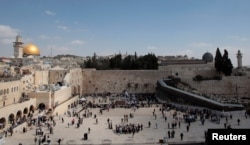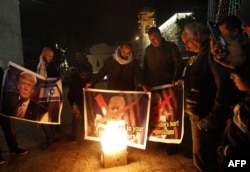U.S. President Donald Trump told Palestinian and Jordanian leaders on Tuesday that he intends to move the U.S. embassy in Israel from Tel Aviv to Jerusalem.
A Palestinian spokesman said Trump called Palestinian President Mahmoud Abbas and informed him of his plan. Abbas then warned Trump of what he called “the dangerous consequences such a decision would have to the peace process and to the peace, security and stability of the region and of the world.”
Trump also spoke with Jordan’s King Abdullah II about his plan.
Trump has not said when the move would happen.
U.S. officials told the Associated Press that they expect Trump to discuss the question of Jerusalem on Wednesday. The officials also said they expect him to make a statement about Jerusalem’s status as the “capital of Israel.”
However, they do not expect the president to use the term “undivided capital.” Those words indirectly express that Israel has sovereignty over east Jerusalem, which is not recognized by the United Nations.
Jerusalem is home to important holy sites for Islam, Judaism, and Christianity. It forms the center of the Arab-Israel conflict.
Israel captured the Arab section in east Jerusalem during the Six-Day War in 1967. It then declared the whole city as its capital. The move is not recognized internationally.
Palestinians also want Jerusalem as its future capital.
Under international agreement and long-standing U.S. policy, the fate of Jerusalem is to be decided in Israeli-Palestinian negotiations.
A recognition of Jerusalem as Israel’s capital would greatly change the traditional approach to the Middle East conflict. On Tuesday, warnings against such a move by the U.S. came from leaders across the region.
In Turkey, President Recep Tayip Erdogan said during a meeting of his ruling party, “Mr. Trump, Jerusalem is the red line of Muslims.” A “red line” is the limit beyond which someone should not go without facing severe effects. Erdogan added that those effects could include cutting Turkey’s ties with Israel.
“I am warning the United States not to take such a step which will deepen the problems in the region,” Erdogan said.
A Palestinian diplomat said recognition of Jerusalem as Israel’s capital could destroy the United States’ role as mediator between Israelis and Palestinians.
The diplomat, Majdi Khaldi, told the Associated Press, “If the Americans recognize Jerusalem as the capital of Israel, then this would mean they decided, on their own, to distance themselves from efforts to make peace and that they will have no credibility or role in this issue.”
He added that, “We will stop our contacts with them because such a step goes against our existence and against the fate of our cause.”
Saudi Arabia's Foreign Ministry warned that such a move would “provoke” strong feelings among Muslims around the world.
Israeli Education Minister Naftali Bennett played down the threat of violence, saying, “At the end of the day, it is better to have a united Jerusalem than Erdogan’s sympathy.”
But Daniel Benjamin, a former U.S. counter terrorism official, told Reuters news agency, ”This is playing with fire.”
I’m Ashley Thompson.
Hai Do adapted this story for Learning English based on AP and Reuters news reports. Ashley Thompsonwas the editor.
Write to us in the Comments Section or on our Facebook page.
_______________________________________________________________
Words in This Story
intend - v. plan to do
consequence - n. something that happens as a result of a particular action
stability - n. the quality or state of being stable
region - n. part of the world
status - n. official position of something
sovereignty - n. power over a country
fate - n. the future that something or someone will have
approach - n. a way of dealing with something
mediator - n. a person who works with opposing sides in a dispute in order to get an agreement
provoke - v. to cause the occurrence of (a feeling or action) : to make (something) happen
sympathy - n. a feeling of support for something
play with fire - idiom. to take unnecessary and dangerous risk







